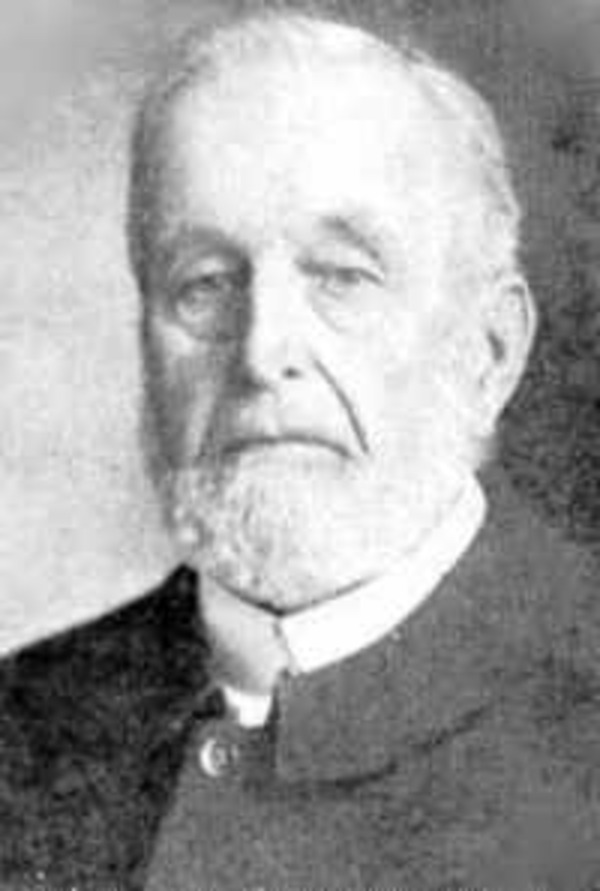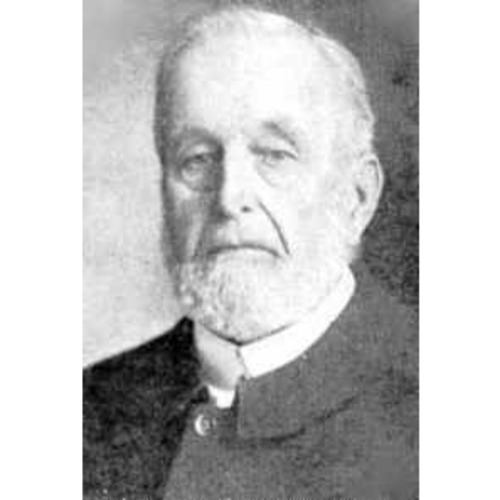
Source: Link
EBY, SOLOMON, farmer and Mennonite elder; b. 15 May 1834 in Woolwich Township, Upper Canada, eldest of the 14 children of Martin Eby and Catharine Weber; m. 17 June 1855 Catharine (Catirine) Shantz (1836–1917) in Bruce County, Upper Canada, and they had nine daughters and three sons, of whom at least six daughters and one son predeceased him; d. 7 Feb. 1931 in Kitchener, Ont., and was buried there in the First Mennonite Cemetery.
Solomon Eby grew up on the family farm in Waterloo County and attended the local common school. In 1853, at an age typical for Mennonite baptisms, he became a member of the Mennonite Church [see Benjamin Eby*]. The following year Solomon and his family moved to the Port Elgin area of Bruce County with other Mennonites who were seeking cheaper farmland than was available in Waterloo County. In 1855 he married Catharine Shantz, and they would farm in Saugeen Township until at least the early 1880s.
By 1858 the Mennonite community at Port Elgin was sizeable enough to warrant a congregation, and on 8 August Bishop Joseph Hagey of Waterloo County ordained Solomon as a minister, and his father, Martin, as a deacon. Solomon, just 24 years old, took his leadership seriously and held services every Sunday even though the custom was to meet every two weeks. The congregation built a meeting house around 1861. By that time Eby had begun to doubt the adequacy of his spiritual condition, since he had not experienced an emotional conversion of the kind typical in denominations such as Methodism. He considered resigning as minister but was persuaded to continue.
In late 1869 the Evangelische Gemeinschaft (Evangelical Association), founded by Methodist preacher Jacob Albright in Pennsylvania, held protracted gatherings, known as revival meetings, in Port Elgin. Some of Eby’s followers had emotional conversion experiences; soon, so did Eby. He began holding weekly evening prayer meetings, which were controversial because they often involved testimonies and theological discussion by non-ordained persons, including women, and they could become quite emotional in tone. Church leaders from Waterloo County investigated Eby’s activities, initially finding them acceptable, and Bishop Hagey baptized new converts. Similar evening prayer meetings in Waterloo County, however, exacerbated the controversy, and the county’s three bishops began to refuse to baptize converts who had been influenced by the meetings unless they would agree to refrain from attending them in future. Solomon Eby, impatient with the Waterloo County bishops, began to perform baptisms and to hold communion services on his own authority. He also allowed non-Mennonites to participate in communion, a violation of traditional policy. After a rancorous meeting of ordained leaders in early 1874, Eby and his followers held a separate communion service, which indicated that division was inevitable. He and a few other leaders then formed their own group. Division soon followed, and on 15 May 1874 they established the Reforming/Reformed Mennonites. The next year they merged with the New Mennonite group, which had been organized in Ontario some 25 years earlier. This assembly, called the United Mennonites, combined in 1879 with the Pennsylvania-based Evangelical Mennonites to become the Evangelical United Mennonites. After being joined by an Ohio-based Brethren in Christ group, in 1883 the church adopted a new name, the Mennonite Brethren in Christ (MBC), which it would retain for the next six decades. At its founding, the MBC consisted of three regional conferences – Ontario, Pennsylvania, and Indiana-Ohio-Michigan – and had a total of 1,647 members.
Solomon Eby was the presiding elder (a position similar to that of a bishop) of the Ontario group from its creation in 1874 until 1886. He worked tirelessly, visiting small congregations in the southwestern and central regions of the province and ordaining pastors. He also engaged with denominational leaders in the United States, especially at the quadrennial General Conference gatherings of delegates from regional conferences, and he worked closely with Daniel Brenneman, the MBC’s founder and leader in Indiana. After the MBC’s Ontario Conference established a position for a second presiding elder in 1891, Eby held one of the two posts until 1895 and again from 1901 to 1903. He was also a pastor to local congregations in Breslau (1886–89), Elmwood (1890–c. 1894), Bethel (1895–99), Markham (1899–1901), and Berlin (Kitchener) (1903–5).
Solomon Eby’s retirement from active service in 1906 did not end his influence on the denomination he had helped to shape. In 1908 the Ontario Conference split over the doctrine of the baptism of the Holy Spirit and the practice of speaking in tongues, both of which were distinguishing features of the new Pentecostal movement. (Henry Schlichter Hallman, a major figure in the MBC, lost his position as editor of the denomination’s journal, the Gospel Banner, after he refused to cease publishing articles about speaking in tongues.) Pentecostal leaders influenced many pastors in the Ontario Conference, including Eby, who personally experienced the baptism of the Holy Spirit in January 1912. He last attended an MBC annual conference in September 1913 but received financial support from the church through 1915. That year the Ontario Conference formally noted that Solomon and his cousin Amos Eby held doctrinal views that were “not in harmony with the M.B.C. Church,” and requested that they “not make use of said views in any way so as to conflict with the M.B.C. Church.” By July 1916 Solomon, now 82 years of age, had withdrawn from the church he had helped to found and affiliated himself with the Kitchener Pentecostal Assembly. That year he ceased to be recognized by the MBC as a retired minister. He died of myocarditis in 1931, at the age of 96.
Solomon Eby possessed an ecumenical evangelical spirit at a time when the majority of Ontario Mennonites practised their faith’s traditions of separation from the outside world and submission to the discernment of the local church community. His belief in and encouragement of emotional conversion experiences, which placed emphasis on one’s personal relationship with God rather than obedience to the church, led to division within his religious community and the establishment of a new denomination that became best known as the Mennonite Brethren in Christ. Eby derived much of his theology from the Evangelische Gemeinschaft but retained key Mennonite principles such as pacifism and simplicity of lifestyle. His later departure to Pentecostalism did not diminish his role in creating a denomination that blended Mennonite and Methodist thought.
LAC, R233-34-0, Ont., dist. Bruce North (28), subdist. Saugeen (B), div. 1: 52; R233-35-2, Ont., dist. Bruce North (177), subdist. Saugeen (C), div. 2: 14; R233-36-4, Ont., dist. Grey South (69), subdist. Bentinck (B), div. 3: 64–65. T. H. Brenneman, “The late Elder Solomon Eby,” Gospel Banner (Elkhart, Ind.), 2 April 1931: 14. Gospel Banner (Berlin [Kitchener], Ont., etc.), 1916–31. L. J. Burkholder, A brief history of the Mennonites in Ontario … ([Toronto], 1935). Conference journal of the Ontario Conference of the Mennonite Brethren in Christ ([Ont.]), 1915: 10. E. E. Eby, A biographical history of Waterloo Township and other townships of the county … (2v., Berlin, 1895–96). “Global Anabaptist Mennonite encyclopedia online”: gameo.org (consulted 24 Jan. 2018). History of the Mennonite Brethren in Christ Church, ed. J. A. Huffman (New Carlisle, Ohio, 1920). S. J. Steiner, In search of promised lands: a religious history of Mennonites in Ontario (Harrisonburg, Va, and Kitchener, 2015). E. R. Storms, History of the United Missionary Church (Elkhart, 1958). Waterloo Region Generations, “Rev. Solomon Eby”: generations.regionofwaterloo.ca/getperson.php?personID=I21857&tree=generations (consulted 24 Jan. 2018).
Cite This Article
Samuel J. Steiner, “EBY, SOLOMON,” in Dictionary of Canadian Biography, vol. 16, University of Toronto/Université Laval, 2003–, accessed December 12, 2025, https://www.biographi.ca/en/bio/eby_solomon_16E.html.
The citation above shows the format for footnotes and endnotes according to the Chicago manual of style (16th edition). Information to be used in other citation formats:
| Permalink: | https://www.biographi.ca/en/bio/eby_solomon_16E.html |
| Author of Article: | Samuel J. Steiner |
| Title of Article: | EBY, SOLOMON |
| Publication Name: | Dictionary of Canadian Biography, vol. 16 |
| Publisher: | University of Toronto/Université Laval |
| Year of publication: | 2025 |
| Year of revision: | 2025 |
| Access Date: | December 12, 2025 |



